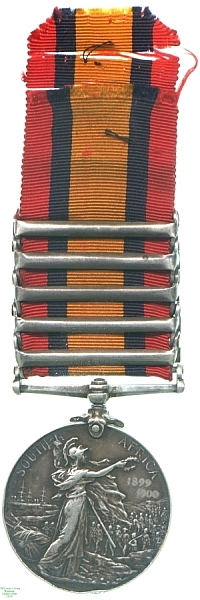
Obverse, a bust of Queen Victoria with veil

Reverse, Britannia in the foreground facing right holding a standard and waving a wreath over an army marching along the shore, with ships offshore in the background

Obverse, a bust of Queen Victoria with veil |

Reverse, Britannia in the foreground facing right holding a standard and waving a wreath over an army marching along the shore, with ships offshore in the background |
During the 1830s and 1840s several Dutch republics had been established outside the British Cape Colony in South Africa, among which were Transvaal and the Orange Free State, all now in modern South Africa. Transvaal was annexed briefly by the British but its independence re-established in the First Boer War.
In the 1880s however the discovery of vast gold reserves in Transvaal brought large numbers of foreign settlers, largely British, across the border, and an attempted coup at the instigation of Cecil Rhodes in 1895. Military escalation followed, negotiations failed and the two Boer republics, convinced that the British intended annexation, declared war in the Cape Colony in October 1899.
The immediate result was the siege of British troops in Ladysmith, Mafeking and Kimberley, while field forces attempting to come to their relief were defeated in several open battles by Boer contingents. Kimberley, the first town to be relieved, could open its gates only in mid-February; Mafeking, famously, had to hold out until May. A relief force sent to Ladysmith was roundly defeated by Louis Botha in January 1900 while attempting to cross the Tugela River at Colenso, and again at Val Krantz on 5 February. The town was finally relieved on 15 February, by which time a fuller Imperial offensive was driving the Boers back. Their resistance in the field was more or less quelled by May 1900, but their forces maintained a bitter and obdurate guerilla campaign in several areas of the two Republics until mid-1902, when a surrender was finally agreed.
This medal was awarded to Corporal W. J. Higgins of the 64th Battery, Royal Field Artillery. He was therefore among the forces that relieved Ladysmith, and also served during their actions reducing Boer positions in the surrounding Tugela area in the days thereafter. From here he seems to have joined the forces operating in the territory beyond Ladysmith, where in May 1900 Boer forces were found occupying the mountain pass of Laing's Nek, where Boer forces had held off the British in the First Boer War in 1881. Imperial units spent a few days cutting it off from resupply before commencing a bombardment and a final assault on 12 June that drove the Boers out of the position in two days.
The period between mid-1900 and mid-1902 saw numerous small actions in the two home and two occupied provinces, service in which was generally recognised by the issue of bars for those provinces. Corporal Higgins appears to have continued serving in what had been Boer territory, earning the bars for both the Orange Free State and the Transvaal.
The earliest issues of the medal indicate that the War was not expected to last as long as it did, as they bear the dates 1899-1900 in the reverse field. Very few were issued in this state, but a large number of the first issues show signs of the dates' erasure, often as in this case insufficiently thorough. Lester Watson acquired this medal at some point before 1928.